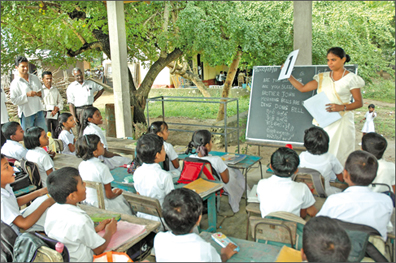|
Bilingual education in Sri Lanka - Part I:
Bilingual education through self-directed learning
G H ASOKA
At various stages of their lives, people use different ways of
learning reflecting various learning strategies they prefer according to
their
|

Bilingual education should begin at primary level. File photo |
various learning styles. Human beings do not always need a teacher
and do not need to be over dependent on teachers despite the fact that
role of the teacher in any society is indispensable, inevitable and
invaluable: human beings informally learn a lot in their physical and
social environments to enrich their knowledge and experience tacitly.
A person, as a learner, can be self-directed in different ways at any
stage of his/her development in education and life. Initially self
directed
learning had been identified and recommended for encouraging
preferably adult learners. Yet it has been revealed through research
that self-directed learning can be made common even for the young by
introducing its various techniques selectively for them depending on
their age-appropriate and grade-appropriate individual capacities.
Use of self-directed learning is quite obvious in bilingual education
both as a process and a product. The Islandwide Needs Survey conducted
by the National Institute of Education in 2007 in Sri Lanka on bilingual
education has unexpectedly noticed how successful bilingual learners
have become self-directed and how they have maintained their
self-directedness in their studies in bilingual education irrespective
of the fact that they, their parents and teachers have faced a lot of
challenges. This is one among many secrets behind success of bilingual
learners in the country mostly over their peers in monolingual
education.
Bilingual education in Sri Lanka
Bilingual education was introduced to the Sri Lankan system of
education in its recent history in 2001 commencing it from GCE (A/L)
classes, and then since 2002, the opportunity has been expanded
introducing it to the classes from Grade six onwards. By the end of
2009, Education Ministry has been able to implement bilingual education
in 601 schools and targets to increase that number up to 800 and 1, 000
by the end of 2010 and 2011 respectively.
The bilingual education program currently implemented in Sri Lanka
allows learners from their Grade six onwards to learn a set of subjects
(recommended through the circular 2008/12) in learners’ L2 (English) and
the rest in one of the national languages (either in Sinhala or Tamil).
The subjects which read primodal social institutions are read only in
national languages. In government schools, primary education is
available compulsorily in national languages. Thus two languages are
used as media of instruction parallel and consecutively in bilingual
learners’ education. This situation has provided learners to be
multilingual and multiliterate or minimum bilingual or biliterate.
According to the Three Year Master Plan collaboratively developed on
bilingual education by the Education Ministry, the vision of the program
in Sri Lanka is ‘widening horizons through language diversity to explore
the world’ with the mission, ‘empowering future generations to be
multilingual (minimum bilingual) using English as a tool representing
Sri Lankan identity’.
The objectives of the program are five in number
1) ‘To develop social harmony and social cohesion in a pluralistic
society using English as a link language both locally and globally,
2) To provide opportunity to all students at secondary level,
irrespective of socio-economic and regional disparities,
3) To acquire proficiency of both first language and English as a
second
Language without jettisoning Sinhala and Tamil as national and
official languages,
4) To enable students to use local languages and English as a source
and a means to reach knowledge society through information literacy’ and
5) ‘To link academic aspects with socio-economic political and
cultural
aspects of the world of work through national languages and the link
language at local and global levels’.
This program of bilingual education, since its inception, has
generally been called ‘English Medium education’ though it was indeed
bilingual education. This misuse of words has done a great damage when
the subject is discussed in terms of educational aspects irrespective of
appropriacy and timely need of bilingual education as bilingual
education: thus the majority of the research so far conducted under this
discipline has been run under the wrong term, ‘English medium
education’, and therefore the literature, suggestions and
recommendations presented, described and prescribed in line with the
wrong term are mostly irrelevant and misleading.
‘English medium education’ is another type of monolingual education
which allows learners to study completely in English from their
beginning of studies. This sort of education does not benefit the
country and its future: it also seriously damages Sri Lankan identity,
culture and their existence by devalorizing Sinhala and Tamil, and
ultimately leading to loss of our local languages and national
integration and national integrity. At the same time, such type of
education negatively influences learners’ cognition and knowledge
displaying its negative outcomes in terms of creativity, critical
thinking and flexibility of mental capacity (metacognitive skills).
Nevertheless, the bilingual education program implemented in the Sri
Lankan school system is expected to achieve balanced bilingualism and
biliteracy in their additive aspects. Thus use of English as a tool is
emphasized to reach developmental goals mingling local aspects with
international aspects and its community.
The writer is the chief project officer and Head of the Unit of
Language Coordination, project leader of Bilingual Education, Faculty of
Languages, Humanities & Social Sciences, National Institute of
Education, Maharagama. |



